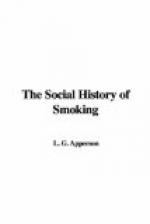The fine lady disliked tobacco. The author of “A Pipe of Tobacco,” in Dodsley’s well-known “Collection,” to which reference has already been made, wrote:
Ladies, when pipes are brought, affect to swoon; They love no smoke, except the smoke of Town. * * * * * * * * * Citronia vows it has an odious stink; She will not smoke (ye gods!)—but she will drink;
and the same writer describes tobacco as “By ladies hated, hated by the beaux.” Although the fine lady may have affected to swoon at the sight of pipes, and belles generally, like the beaux, may have disdained tobacco as vulgar, yet there were doubtless still to be found here and there respectable women who occasionally indulged in a smoke. In an early Spectator, Addison gives the rules of a “Twopenny Club, erected in this Place, for the Preservation of Friendship and good Neighbourhood,” which met in a little ale-house and was frequented by artisans and mechanics. Rule II was, “Every member shall fill his pipe out of his own box”; and Rule VII was, “If any member brings his wife into the club, he shall pay for whatever she drinks or smokes.”
In one of the valuable volumes issued by the Georgian Society of Dublin a year or two ago, Dr. Mahaffy, writing on the mid-eighteenth century society of the Irish capital, quotes an advertisement by a Dublin tobacconist of “mild pigtail for ladies” which suggests the alarming question—Did Irish ladies chew?
It has sometimes been supposed that the companion of Swift’s Stella, Mrs. Rebecca Dingley, was addicted to smoking. In the letters which make up the famous “Journal to Stella,” there are several references by Swift to the presents of tobacco which he was in the habit of sending to Mrs. Dingley. On September 21, 1710, he wrote: “I have the finest piece of Brazil tobacco for Dingley that ever was born.” In the following month he again had a great piece of Brazil tobacco for the same lady, and again in November: “I have made Delaval promise to send me some Brazil tobacco from Portugal for you, Madam Dingley.” In December, Swift was expressing his hope that Dingley’s tobacco had not spoiled the chocolate which he had sent for Stella in the same parcel; and three months later he wrote: “No news of your box? I hope you have it, and are this minute drinking the chocolate, and that the smell of the Brazil tobacco has not affected it.” The explanation of all this tobacco for Mistress Dingley is to be found in Swift’s letter to Stella of October 23, 1711. “Then there’s the miscellany,” he writes, “an apron for Stella, a pound of chocolate, without sugar, for Stella, a fine snuff-rasp of ivory, given me by Mrs. St. John for Dingley, and a large roll of tobacco which she must hide or cut shorter out of modesty, and four pair of spectacles for the Lord knows who.” The tobacco was clearly not for smoking, but for Dingley to operate upon with the snuff-rasp, and so supply herself with snuff—a luxury, which in those days, was as much enjoyed and as universally used by women as by men.




